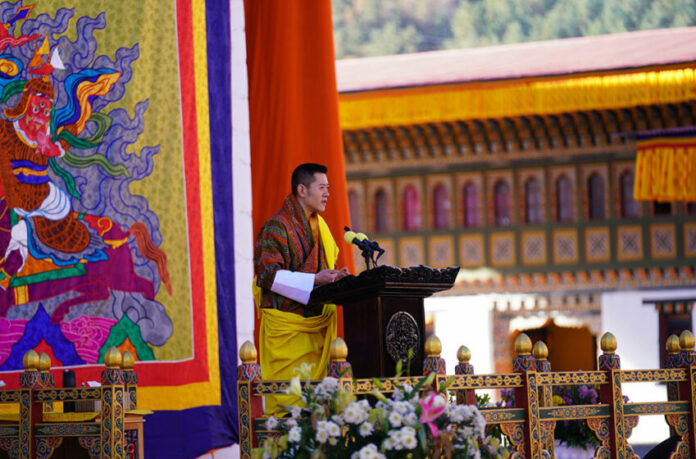Ramananda Sengupta December 21, 2023
Bhutan celebrated its 116th National Day on December 17. Addressing the nation from Changlimithang Stadium at Thimphu, King Jigme Khesar Namgyel Wangchuck highlighted the establishment of a Special Administrative Zone (SAZ) at Gelephu named the Mindfulness City. Expectations were rife for major announcements on the development front as Bhutan has been facing economic challenges in the recent years.
Amit Sharma is a retired Army officer who spent more than two of his 21 years in service with the Indian Military Training Team supporting logistics for the Royal Bhutanese Army, before seeking premature retirement and joining a large Indian conglomerate. He spoke to Ramananda Sengupta on the significance of the historic speech, and what it really means for Bhutan, India, Bangladesh, China and the rest of the world.
Excerpts:
The Background
The landlocked kingdom was deeply impacted by the Covid 19 lockdowns that force-stopped it’s fragile financial ecosystem. Despite efforts to shield against it, the deadly virus found its way into the country, severely impacting Bhutan’s two primary revenue sources: hydropower exports and tourism. With zero tourism, many Bhutanese lost their livelihoods. When the borders finally opened, many young Bhutanese migrated to countries like Australia, Canada and the United States, which have a certain quota for Bhutanese. With a population of just seven and a half lakh, even 20,000 people (and eventually their families) migrating to one country means the loss of a fairly large percentage of young, qualified and productive people.
The Solution
Recognizing the need to manage expectations and stimulate economic growth, Bhutan’s government has announced a spending-oriented economic development plan. The plan involved reviving dormant projects, including a dry port at Phuntsholing, extending a railway line, and the establishment of a 1000 square km Special Administrative Zone (SAZ) along the southern border with India. The wholistic hub with integral policy enablers, multi-modal transport convergence & an extended South-Asian focus is poised to be a legacy project with multi-generation impact.
Not An SEZ
Unlike a Special Economic Zone (SEZ), an SAZ gives Bhutan the integral advantage of an autonomous authority which can implement trade-friendly laws and policies limited to the zone, which are not applicable to the rest of the country. This is likely to boost manufacturing, services and trade and curb illegal practices like cross-border smuggling and fronting.
(Since non-Bhutanese cannot own businesses in Bhutan, they resort to an illegal practice called Fronting, which essentially involves using a Bhutanese as a front for their business by paying them a fee or a commission. But this means there is tax evasion on both sides, with even businesses that want to invest preferring to lower their tax liabilities using this method).
An SAZ would prevent such ad-hoc processes, and Bhutan will gain from more trade not just with India, but also with Bangladesh.
Happiness Rules
Rooted in Bhutan’s vision of Gross National Happiness (GNH), the Gelephu Mindfulness City seeks to attract foreign investment through a favourable business environment and incentives while preserving Bhutanese culture and values. The project, which requires substantial investments in public infrastructure, is expected to benefit the entire nation by creating private sector opportunities, generating jobs, and fostering advanced technology.
Southern Accent
In his address, the King also expressed gratitude for India’s commitment to improving Bhutan’s infrastructure and connecting border towns with railway lines. The proposed land connections, cutting across Assam, aims to create a dynamic economic corridor bridging South Asia with Southeast Asia. While responsibly sourced goods from Bhutan will find buyers in the Indian market, such structured trade ecosystems are sure to offer Bhutanese the growth aspirations at home. Bhutan has embarked on a journey to adopt new age technologies like digital wallets, UPI, blockchain based crypto mining and hopes to derive benefits from the Indian experience. Of late, RuPay cards are being accepted in Bhutan, which means the “black cash” component of Indo-Bhutanese trade will decline.
Talk Option
Bhutan also continues to engage with China towards resolving its boundary issues. To stop or stall the salami slicing of their territory by China, they might be placating Beijing by talking about friendship and trade, but in their hearts they are aware that no matter what concessions they give the Chinese, the latter will ask for more. This also hold true when India deals with China. So what options does Bhutan have?
While it walks a diplomatic tightrope on that side, concrete actions like the SAZ are proof of Bhutan’s strong relations with India and the government’s commitment to the economic upliftment of the people.
Global Connect
His Majesty emphasized the transformative nature of the Gelephu project, positioning it as a gateway connecting Bhutan to the world. Beyond economic goals, Gelephu embodies a conduit for global markets, capital, innovation, knowledge, and technology—a pivotal moment in Bhutan’s history and a testament to the country’s commitment to sustainable and conscious economic growth.





